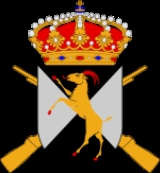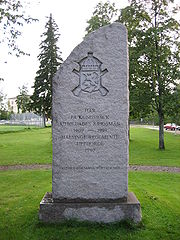
Hälsinge regemente
Encyclopedia
Hälsinge regemente designations I 14, I 14/Fo 49 and I 14/Fo 21, was a Swedish Army
infantry
regiment
that traced its origins back to the 16th century. It was disbanded in 1997. The regiment's soldiers were originally recruited from the provinces of Hälsingland
and Gästrikland
, and it was later garrisoned in Gästrikland.
, Ångermanland
and Västerbotten
—were organised by Gustav II Adolf into Norrlands storregemente
, of which eleven of the total 24 companies were recruited in Hälsingland and Gästrikland. Norrlands storregemente consisted of three field regiments, of which Hälsinge regemente was one. Sometime around 1624, the grand regiment was permanently split into three smaller regiments, of which Hälsinge regemente was one.
The regiment was officially raised in 1630 although it had existed since 1624. Hälsinge regemente was one of the original 20 Swedish infantry regiments mentioned in the Swedish constitution
of 1634. The regiment was also called Joakim Brahes regemente after its first commander Joakim Brahe. It was allotted
in 1682 as the second Swedish regiment to be so, after Dalregementet
.
The regiment was given the designation I 14 (14th Infantry Regiment) in a general order
in 1816. Hälsinge regemente was garrisoned in Gävle
from 1909. In 1973, the regiment gained the new designation I 14/Fo 49 as a consequence of a merge with the local defence area Fo 49. When the local defence area changed designation to Fo 21 in 1982, the designation changed to I 14/Fo 21. The regiment was disbanded in 1997, and the barracks
that had been refurbished in 1995–1996 were turned into a college campus for the University College of Gävle
.

1814(?)
Swedish Army
The Swedish Army is one of the oldest standing armies in the world and a branch of the Swedish Armed Forces; it is in charge of land operations. General Sverker Göranson is the Supreme Commander-in-Chief of the Army.- Organization :...
infantry
Infantry
Infantrymen are soldiers who are specifically trained for the role of fighting on foot to engage the enemy face to face and have historically borne the brunt of the casualties of combat in wars. As the oldest branch of combat arms, they are the backbone of armies...
regiment
Regiment
A regiment is a major tactical military unit, composed of variable numbers of batteries, squadrons or battalions, commanded by a colonel or lieutenant colonel...
that traced its origins back to the 16th century. It was disbanded in 1997. The regiment's soldiers were originally recruited from the provinces of Hälsingland
Hälsingland
' is a historical province or landskap in central Sweden. It borders to Gästrikland, Dalarna, Härjedalen, Medelpad and to the Gulf of Bothnia...
and Gästrikland
Gästrikland
' is a historical province or landskap on the eastern coast of Sweden. It borders Uppland, Västmanland, Dalarna, Hälsingland and the Gulf of Bothnia. Gästrikland is the southernmost of the Norrland provinces....
, and it was later garrisoned in Gästrikland.
History
The regiment has its origins in fänikor (companies) raised in Hälsingland and Gästrikland in the 1550s and 1560s. In 1615, these units—along with fänikor from the nearby provinces of MedelpadMedelpad
' is a historical province or landskap in the north of Sweden. It borders to Hälsingland, Härjedalen, Jämtland, Ångermanland and the Gulf of Bothnia....
, Ångermanland
Ångermanland
' is a historical province or landskap in the north of Sweden. It borders to Medelpad, Jämtland, Lapland, Västerbotten and the Gulf of Bothnia. The name "Ångermanland" comes from the Old Norse "anger", which means "deep fjord" and refers to the deep mouth of the river Ångermanälven...
and Västerbotten
Västerbotten
', English exonym: West Bothnia, is a province or landskap in the north of Sweden. It borders Ångermanland, Lapland, Norrbotten and the Gulf of Bothnia. It is famous for the cheese with the same name as the province.- Administration :...
—were organised by Gustav II Adolf into Norrlands storregemente
Norrlands storregemente
Norrlands storregemente or Landsregementet i Norrland was one of the nine grand regiments organized by Gustavus Adolphus in the late 1610s and split into smaller regiments in the 1620s....
, of which eleven of the total 24 companies were recruited in Hälsingland and Gästrikland. Norrlands storregemente consisted of three field regiments, of which Hälsinge regemente was one. Sometime around 1624, the grand regiment was permanently split into three smaller regiments, of which Hälsinge regemente was one.
The regiment was officially raised in 1630 although it had existed since 1624. Hälsinge regemente was one of the original 20 Swedish infantry regiments mentioned in the Swedish constitution
Constitution
A constitution is a set of fundamental principles or established precedents according to which a state or other organization is governed. These rules together make up, i.e. constitute, what the entity is...
of 1634. The regiment was also called Joakim Brahes regemente after its first commander Joakim Brahe. It was allotted
Swedish allotment system
The allotment system was a system used in Sweden for keeping a trained army at all times. This system came into use in around 1640, and was replaced in the early 1900s by the Swedish Armed Forces conscription system...
in 1682 as the second Swedish regiment to be so, after Dalregementet
Dalregementet
Dalregementet , designations I 13 and I 13/Fo 53, was a Swedish Army infantry regiment that traced its origins back to the 16th century. It was disbanded in 2000...
.
The regiment was given the designation I 14 (14th Infantry Regiment) in a general order
General order
In militaries, a general order is a published directive, originated by a commander, and binding upon all personnel under his command, the purpose of which is to enforce a policy or procedure unique to his unit's situation which is not otherwise addressed in applicable service regulations, military...
in 1816. Hälsinge regemente was garrisoned in Gävle
Gävle
Gävle is a city in Sweden, the seat of Gävle Municipality and the capital of Gävleborg County. It had 71,033 inhabitants in 12/31 2010. It is the oldest city in the historical Norrland , having received its charter in 1446 from Christopher of Bavaria.-History:It is believed that the name Gävle...
from 1909. In 1973, the regiment gained the new designation I 14/Fo 49 as a consequence of a merge with the local defence area Fo 49. When the local defence area changed designation to Fo 21 in 1982, the designation changed to I 14/Fo 21. The regiment was disbanded in 1997, and the barracks
Barracks
Barracks are specialised buildings for permanent military accommodation; the word may apply to separate housing blocks or to complete complexes. Their main object is to separate soldiers from the civilian population and reinforce discipline, training and esprit de corps. They were sometimes called...
that had been refurbished in 1995–1996 were turned into a college campus for the University College of Gävle
University College of Gävle
Gävle University College is a university college located in Gävle, Sweden. It uses the name "University of Gävle" in English, although it is officially a 'University College'...
.
Campaigns

- The Swedish War of LiberationSwedish War of LiberationThe Swedish War of Liberation , , was a civil war in which the Swedish nobleman Gustav Vasa successfully deposed the Danish king Christian II as regent of the Kalmar Union in Sweden. The war started in January 1521 when Gustav Vasa was appointed "hövitsman" over Dalarna. After Gustav Vasa sacked...
(1521–1523) - The Northern Seven Years' WarNorthern Seven Years' WarThe Northern Seven Years' War was the war between Kingdom of Sweden and a coalition of Denmark–Norway, Lübeck and the Polish–Lithuanian union, fought between 1563 and 1570...
(1563–1570) - The War against Russia (1590–1595)
- The Polish WarPolish–Swedish War (1600–1629)The Polish–Swedish War was twice interrupted by periods of truce and thus can be divided into:* Polish–Swedish War * Polish–Swedish War...
(1600–1629) - The Thirty Years' WarThirty Years' WarThe Thirty Years' War was fought primarily in what is now Germany, and at various points involved most countries in Europe. It was one of the most destructive conflicts in European history....
(1630–1648) - The Torstenson War (1643–1645)
- The Northern WarsNorthern WarsNorthern Wars is a term used for a series of wars fought in northern and northeastern Europe in the 16th and 17th century. An internationally agreed nomenclature for these wars has not yet been devised...
(1655–1661) - The Scanian WarScanian WarThe Scanian War was a part of the Northern Wars involving the union of Denmark-Norway, Brandenburg and Sweden. It was fought mainly on Scanian soil, in the former Danish provinces along the border with Sweden and in Northern Germany...
(1674–1679) - The Great Northern WarGreat Northern WarThe Great Northern War was a conflict in which a coalition led by the Tsardom of Russia successfully contested the supremacy of the Swedish Empire in northern Central Europe and Eastern Europe. The initial leaders of the anti-Swedish alliance were Peter I the Great of Russia, Frederick IV of...
(1700–1721) - The Hats' Russian War (1741–1743)
- The Seven Years' WarSeven Years' WarThe Seven Years' War was a global military war between 1756 and 1763, involving most of the great powers of the time and affecting Europe, North America, Central America, the West African coast, India, and the Philippines...
(1757–1762) - The Gustav III's Russian War (1788–1790)
- The Finnish WarFinnish WarThe Finnish War was fought between Sweden and the Russian Empire from February 1808 to September 1809. As a result of the war, the eastern third of Sweden was established as the autonomous Grand Duchy of Finland within the Russian Empire...
(1808–1809) - The Campaign against NorwaySwedish campaign against Norway (1814)The Swedish-Norwegian War, also known as the Campaign against Norway, was fought between Sweden and Norway in the summer of 1814. The war resulted in Norway entering into union with Sweden, but with its own constitution and parliament.-Background:...
(1814)
Organisation
1634(?)- Livkompaniet
- Överstelöjtnantens kompani
- Majorens kompani
- Alsta kompani
- Delsbo kompani
- Ovansjö kompani
- Arbrå kompani
- Jervsö kompani
1814(?)
- Livkompaniet
- Forssa kompani
- Järvsö kompani
- Delsbo kompani
- Färnebo kompani
- Arbrå kompani
- Alfta kompani
- Ovansjö kompani
Name, designation and garrison
| Name | Translation | From | To | |
|---|---|---|---|---|
| Joakim Brahes regemente | Joakim Brahe's Regiment | 1630 | – | 1634 |
| Hälsinge regemente | Hälsingland Regiment | 1633 | – | 31 December 1997 |
| Designation | From | To | |
|---|---|---|---|
| I 14 | 1816 | – | 30 June 1973 |
| I 14/Fo 49 | 1 July 1973 | – | 30 June 1982 |
| I 14/Fo 21 | 1 July 1982 | – | 31 December 1997 |
| Training ground or garrison town |
From | To | |
|---|---|---|---|
| Florhed | 1630 | – | 1689 |
| Mohed Mohed Mohed is a locality situated in Söderhamn Municipality, Gävleborg County, Sweden with 416 inhabitants in 2005. It was the site for the orienteering competition known as O-Ringen in 1981,2006 and will be the site of the 2011 competition from July 23 - 29.... |
1689 | – | 14 February 1909 |
| Gävle Gävle Gävle is a city in Sweden, the seat of Gävle Municipality and the capital of Gävleborg County. It had 71,033 inhabitants in 12/31 2010. It is the oldest city in the historical Norrland , having received its charter in 1446 from Christopher of Bavaria.-History:It is believed that the name Gävle... (G) |
15 February 1909 | – | 31 December 1997 |

